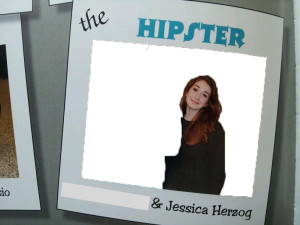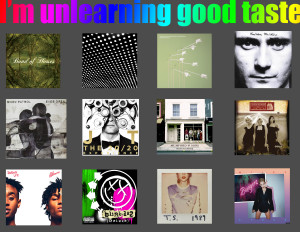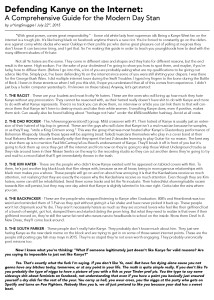I’m a reformed music snob
Category / Class 4
Taste.
I hate the social construction of taste. By collecting records, drinking dark coffee and having an iPhone all of a sudden you have more cultural currency than someone who listens to One Direction, drinks Sunny D and has a flip phone. These ideas we link to our level of education and therefore our wealth and intelligence. With the rise of fast fashion and more easily accessible forms of cultural currency there has been a need to divide what is good and what is bad in order to other, to bring ourselves up higher in the hierarchy and push everyone else down as we go. To respond to this article I coded a ridiculous list of people to avoid
people to avoid
A list of People to Avoid
(whom have universerally understood terrible taste (in no particular order))
- belibers
- directioners
- Raven Symone
- people who enjoy playing monopoly
- your dad
- people who own record players
- self proclaimed intelectuals and philosophers
- fuqbois
- people who do soul cycle
- your local community theatre
How can a designer clarify the point of a website to create a more successful website vs one of “good taste”?
While reading this article, I agree that everything that is an art form is subjective. I believe however there is a rate of successfulness dependent on what the designer wanted to accomplish in the end. Being worried about creating with good taste gets in the way of being completely creatively free and can hinder the successfulness or the end product. The thought to not “start out with a solution set (because) that has already excluded a majority of the possibilities” which makes me wonder if designers at large corporations aren’t given the final end note then how could they find a satisfying end with nothing met or really assigned. However, maybe a solution is not directly related to what is needed at the end, ie a portfolio website. I believe to clearly create a succesful website that is not necessarily related to good taste is to have an end goal and a general path (clear wireframes, static mockups etc.) to follow so the process doesn’t keep going round circle and not have anywhere to end.
Reading Response 4
When thinking about design, it is important to think about the audience that you’re trying to reach.
The first step, establish the audience you’re trying to reach. Unfortunately, it is impossible to please everyone. We are all entitled to our own opinion, as long as it can be justified.
There are many talented people today that you may not be able to related to but that doesn’t mean that other cannot relate as well. Jack Hamilton said, “If you enjoy Macklemore, you have terrible taste in music.” Some may defended that statement, but for others, that cannot be true due to the large population of Macklemore fans, myself included. You cannot state whether someone is talented or not, it is strictly an opinion.
For me, I agree with the statement “Beauty lies in the eye of the beholder”, everyone is entitled to his or her own opinion.
Response: Good Taste Doesn’t Matter
For my response to the article Good Taste Doesn’t Matter I chose to create a webpage. The webpage contains a summary and a drawn picture of a man riding an elephant. I chose to use this media because I thought it would be interesting to use my web design skills.
The orange color of the background is a warmer color and stands out against the black text. I chose the fonts of the headings from Google Fonts and the rest of the article is in Helvetica so it is simple and easy to read.I felt it added to the modern theme of the article. The drawing represents the metaphor the author describes in the article and I felt it was a key component to the reading.
file:///Users/AllisonPinz/Documents/Good%20Taste%20Doesn’t%20Matter.html
Reading Response (Class 4)
Is “killing your idols” the end all be all in regards to the myth of objectivity?
reading | good taste doesn’t matter
Topics like objective beauty and the importance of taste make up a good portion of the worry in my head as an artist/designer. These might all be symptoms of trying to predict the future. And of course, this thought pattern is fueled heavily (if not exclusively) by ego.
I was notorious among my peers for discussing art, music, pop culture, whatever to a nauseating degree. I would voice my opinion on everything and would not sugarcoat it. Actually, the more harsh, offensive, attention-grabbing, the better. It was annoying and everyone was sick of it, but it got me plenty of attention. (See: my high school senior superlative)

the other person who was deemed my counterpart for this title was the only dude that could tolerate/enjoy my bravely voiced opinions. I’ll give it to him, because he was equally if not more annoying.
Often upheld in history are the opinions of the academic, the intellectual, the professional, the connoisseur. Opinions that have been justified to be exceptionally significant.
Recently since our reading and writing skills have become widespread, it seems that those two things are all you need to get your opinion exposed to a community of millions. The next step: make a blog. Even better, maintain this blog for a long enough time —> ??? —> ????? —> become a fleeting ‘contributor’ to websites that publish glorified blog posts as bonafide ~*~articles~*~! Hundreds of people are now entertaining your thoughts. Your master-think-pieces.
It really is a beautifully powerful thing. This newfound accessibility and variety of opinions that have gained traction in the last decade is exciting. Rants, mock-arguments and criticisms are able to reach new depths of digesting entertainment.
However, before it’s all fun and games, there are usually some burns to tend to; stuff that cuts and jabs. Some arguments go to excruciatingly personal lengths to target those who might disagree. (See: Defending Kanye on the Internet)
It was a cool move of the author Nishant Kothary to make contrasting references – quoting both significant , published critics with those whose opinions are far less significant to the academic community, but are equally published nonetheless.
Reading Response 4
Question: Is it possible to make something that is objectively beautiful?
“Beauty does lie in the eye of the beholder, but that some beholders are better able to identify that elusive, but existent true beauty.”
This is a good summary for most of the text. It’s basically a nicer way of saying that a person’s opinion is only valid if they have good taste. Being in the arts, I’m definitely guilty of feeling this way about people sometimes, especially if they’re critiquing my work. During my time at Parsons, i’ve noticed that no matter how amazed I am with a person’s work, there will always be another person who doesn’t like it as much, or has something to critique about it. However, I think that anyone can respect the amount of time someone put into their work, especially if the work is very intricate and is well done technically. Because of this, I think that it is somewhat possible for a work to objectively beautiful technically, but not conceptually. It has to with aspects of personal taste, not exactly how refined a person’s taste are, but a matter of preference .
Reading Response Week 3
As Derrida points out in the reading “From One to Zero”, is it correct to say that books are tools for us to forget?
In thinking more about the subject, I might say that Derrida’s opinion is understandable, due to the fact that, at that time, with the help of books to remember us of several stories that were before, stored in our minds, we allow ourselves to forget, because the book will remind us after all. All it takes is reading it. On the other hand, this could be true back then, however, with the amount of information that is out there nowadays, it may be impossible for us to remember everything without the help of a tool. And so, in this case, the book is a tool used to remember. If you think about it, now, not even books are being enough anymore to store the amount of information that we have. It got to a point that they took too much space, and the invention of the computer and later of e-books, that is, information compressed in one single device was a wonderful idea, some might say.
Moreover, as the reading “From Zero to One” said, these online libraries also made information to be spread much more easily and accessible to more people, once there wasn’t a limited amount of copies and it could be “accessed through an infinite number of web browsers”. Although, it is interesting to notice, in the end of the reading, that more and more each new version of the Kindle wants to look more book-like, that is, people still want the same feeling as when they are reading an actual book. However, they don’t want the constrains that come with a book.

